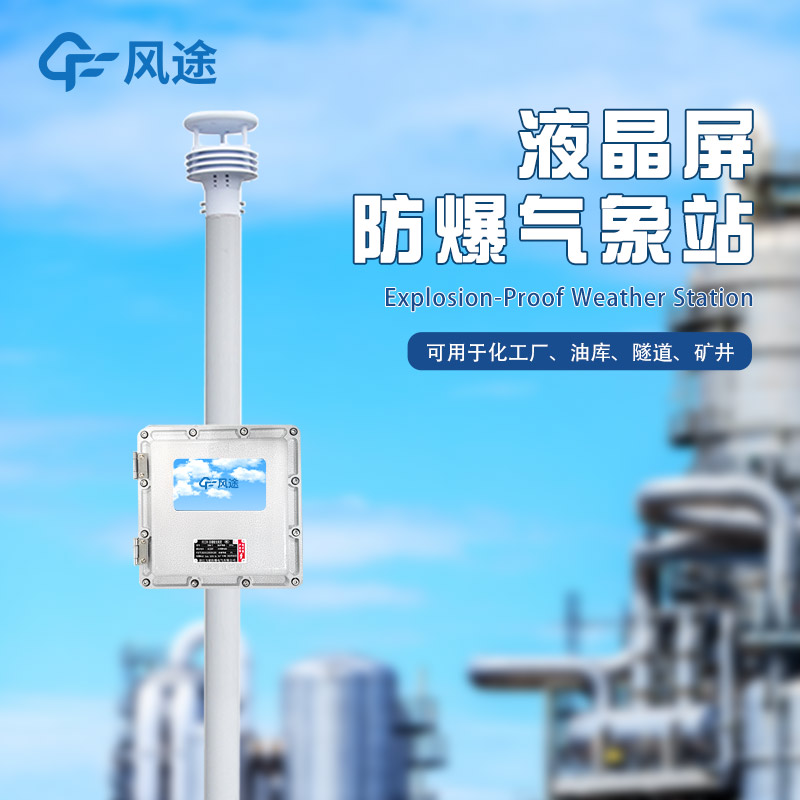Meteorological environment monitoring equipment supplier
Insist on doing high-precision customer favorite technology products
In the field of chemical production, safety is of utmost importance. The Industrial Weather Station in chemical plants is of great significance for ensuring safe production.
The Industrial Weather Station in chemical plants is equipped with high - precision sensors and can continuously monitor a variety of meteorological parameters 24 hours a day. Changes in air temperature have a significant impact on the chemical reaction rate and product stability. Different chemical production processes have strict temperature requirements, and accurate temperature monitoring is the key to ensuring that production proceeds under suitable temperature conditions. Humidity monitoring is also crucial. Excessively high or low humidity may cause chemical raw materials to deteriorate, equipment to corrode, and even interfere with certain chemical reactions. The monitoring of wind speed and direction is closely related to exhaust gas emission and diffusion. Mastering this information helps factories arrange production rationally and prevent exhaust gas from endangering the surrounding environment and people. Data such as atmospheric pressure and precipitation also provide important bases for the refined management of chemical production.
Based on algorithms and models, the Industrial Weather Station deeply analyzes historical meteorological data and real - time monitoring data to predict possible extreme weather or meteorological disasters in the future, such as rainstorms, lightning, and strong winds. Once potential risks are detected, it quickly sends out warning signals to remind the factory to take preventive measures in a timely manner. For example, upon receiving a rainstorm warning, the factory can check the drainage system in advance and reinforce outdoor equipment. In the face of a lightning warning, it can promptly shut down production equipment that is easily affected and strengthen inspections in flammable and explosive areas. When strong winds are predicted, protective measures for high - altitude operation equipment can be taken in advance to avoid safety accidents caused by strong winds.
Considering the existence of flammable, explosive, toxic, harmful, and corrosive hazards in chemical plants, the Industrial Weather Station adopts high - level protective measures in its design and manufacturing. Its outer shell is made of special anti - corrosion materials, which can effectively resist the erosion of various corrosive substances generated in chemical production and extend the service life of the equipment. At the same time, it has explosion - proof performance, using explosion - proof technologies and materials to ensure that in potentially explosive environments, the weather station will not trigger larger safety accidents due to sparks or high temperatures generated by itself. It also excels in waterproof, shock - proof, and dust - proof capabilities. Whether in severe weather conditions or the complex production environment within the factory, its normal operation will not be affected, ensuring the stability and accuracy of data monitoring.
The Industrial Weather Station in chemical plants provides multi - faceted support for enterprise safety production and management. Through real - time monitoring and accurate early warnings, it significantly reduces safety risks caused by meteorological factors and ensures the continuity and stability of the production process. In terms of production optimization, adjusting production processes and equipment operation parameters according to meteorological data can improve production efficiency and reduce energy consumption. For example, in high - temperature weather, appropriately adjusting the temperature control parameters of certain reactions can not only ensure product quality but also avoid equipment failures caused by overheating. The data provided by the weather station also provides a scientific basis for enterprise decision - making, helping managers make more reasonable judgments and choices in formulating production plans and arranging equipment maintenance.
